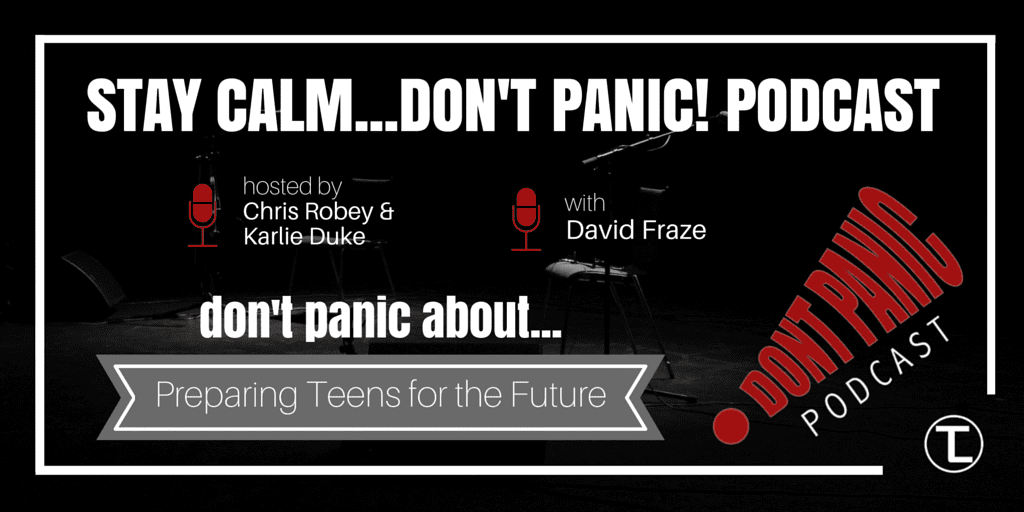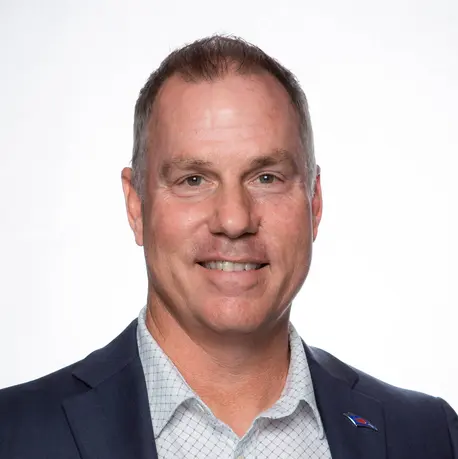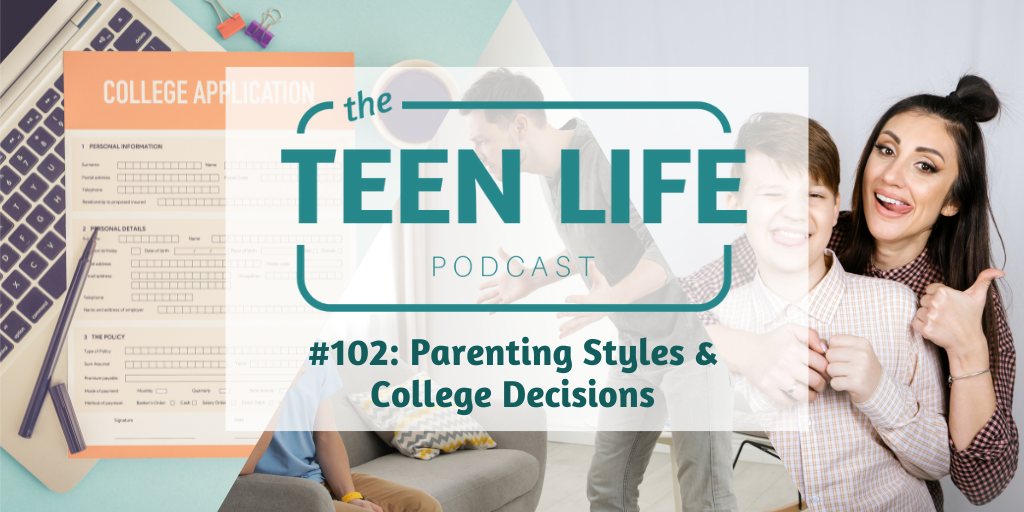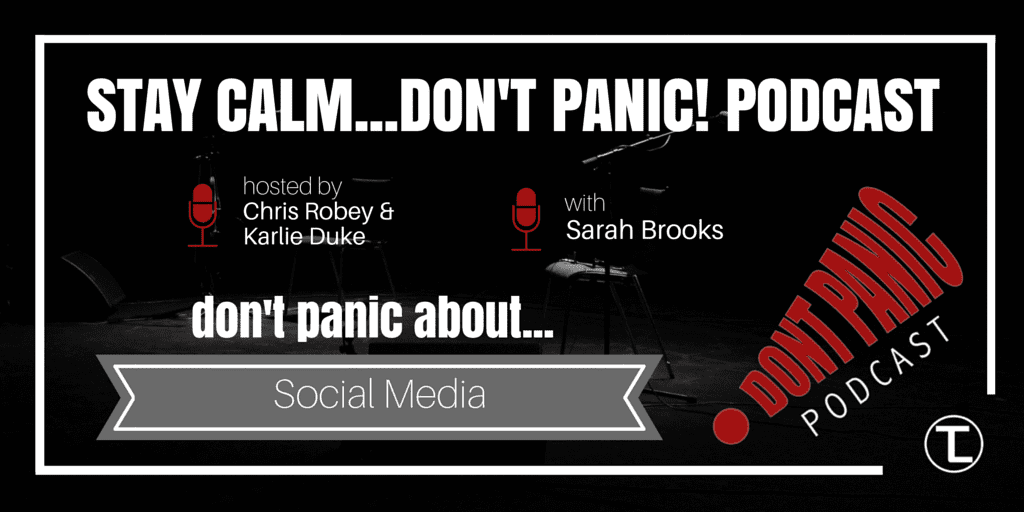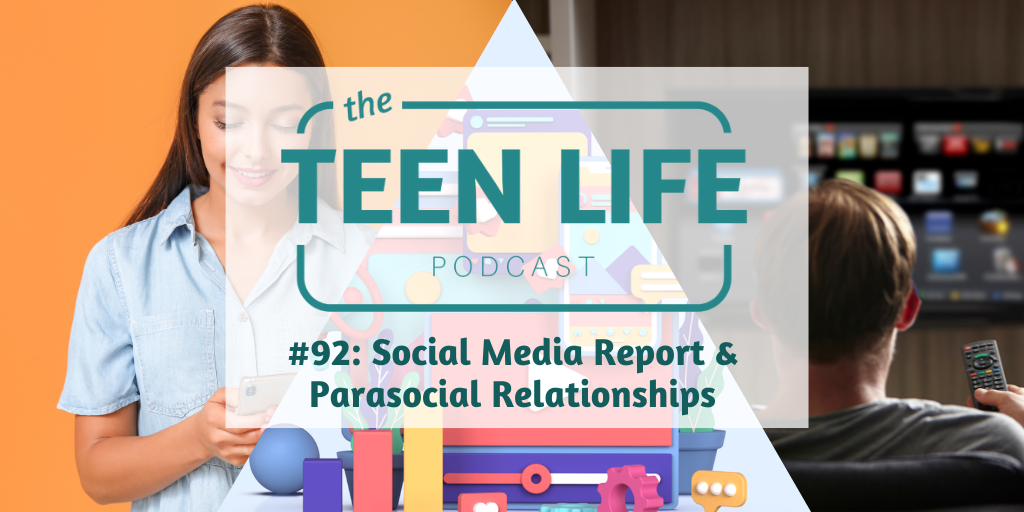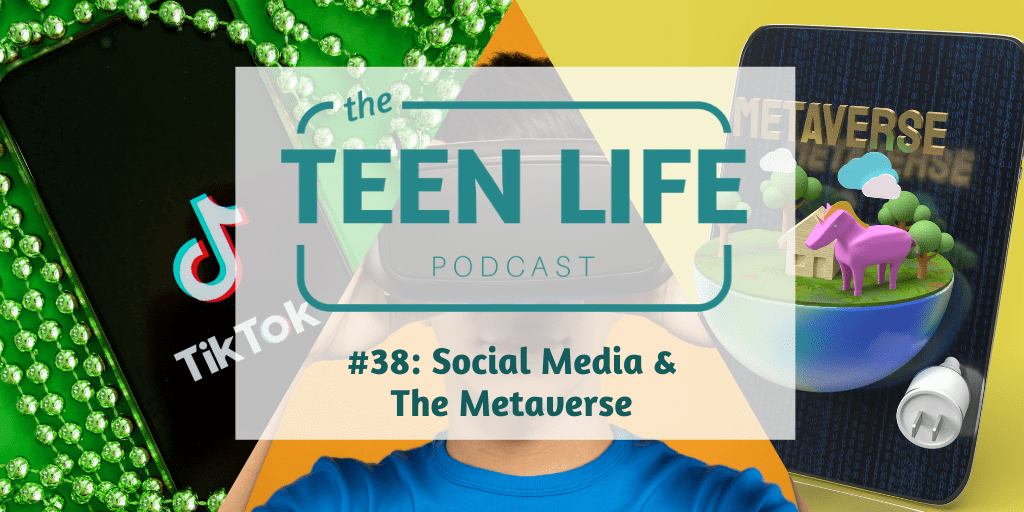
by Ricky Lewis | May 12, 2016 | Parenting, Support Groups
All of us who work with teenagers have a difficult task. How do we sort through the noise of adolescent life and glean the important information students are trying to tell us so that we can be a helpful adult in their lives? Of course, there is no perfect answer but as I have worked with teenagers for over a decade, some things have stood out as effective listening strategies. Teen Life even uses more than 10% of the time in our 1-day Facilitator Training to talk about how to listen better.
To set this up, you will need to set aside some assumptions. First, as adults we have to believe that we do not have all the answers. This requires a daily reminder for most of us and for some like me, multiple times a day. I tend to think the life experience I have equals relevant information for the kids in my house or the students I work with. The problem here is there are too many details missing for us to make that big of an assumption. This is not to say that there is no value to our experience, that is a big part of what we rely on to learn from. I do believe it is true though that our experience is not the most important factor but instead how we handled that experience. That said, we must be willing and able to hear what a particular student is going through (really hear it) before we can realize the most important lesson we can share from what we have learned and model for them the “how” of handling things rather than the “what to do” in a particular situation.
Once we have our mindset in the right place, we can move forward with developing our listening skills.
1. Don’t be afraid to admit you missed something.
As humans, our brains are constantly processing what is coming our way. This includes engagement in conversation with anyone. The difficulty is that it is hard to stop this process from happening since we are wired that way. Since this is true, it is completely appropriate to admit your brain was thinking about something else and you need the person to repeat what they just said so you can make sure you are catching what they are sharing with you.
2. Intentionally pause 15 seconds once the person stops talking.
The key here is to do this intentionally, allowing time for the person to be done with their thought. In addition you can use this time to form a response either to summarize what you heard, ask for clarification or offer advice. If you are intentional about this, you are less likely to fall prey to number 1 above.
3. Limit your comments.
This takes a lot of practice because we all want to believe that what we think is valuable. However, it is important to realize that it is only valuable if the people you are sharing it with see it that way. If you decide going into a conversation you are only going to speak things related to the conversation, it will help you listen more intently and offer more helpful, relevant questions and thoughts.
4. Pay attention to what matters, not every word they say.
If you have worked with teenagers for longer then 6 weeks, you know that not everything they say is important or helpful to knowing what is really going on. That said, we have to work hard to listen carefully and catch the pieces that are most important to focus on those. Once you practice this a few times, it gets easier and you will find you’re able to listen for words, phrases, inflection or even pace of speech that tips you off to what is important.
5. If you can’t listen now, ask the person to wait.
As adolescents, and this applies to younger kids too, there is a tendency to just jump in and start talking whether the person is listening or not. At our house, my wife has started handling this very effectively. She will say “I really want to listen to you because you are important, but I can’t right now. Give me a few minutes, and I will focus on what you want to tell me.” Yeah, she is pretty good at this stuff!
So now it’s up to you to decide. Is this helpful? Does it bring up thoughts or questions you want to share?
Comment below or reach out to us on social media or by email. We want to keep growing, and we hope you do too. If you did find this helpful, take a minute to forward the email, post it online or tell a friend – you don’t even have to give us credit (though we are okay if you do :).
Founder & Former Executive Director
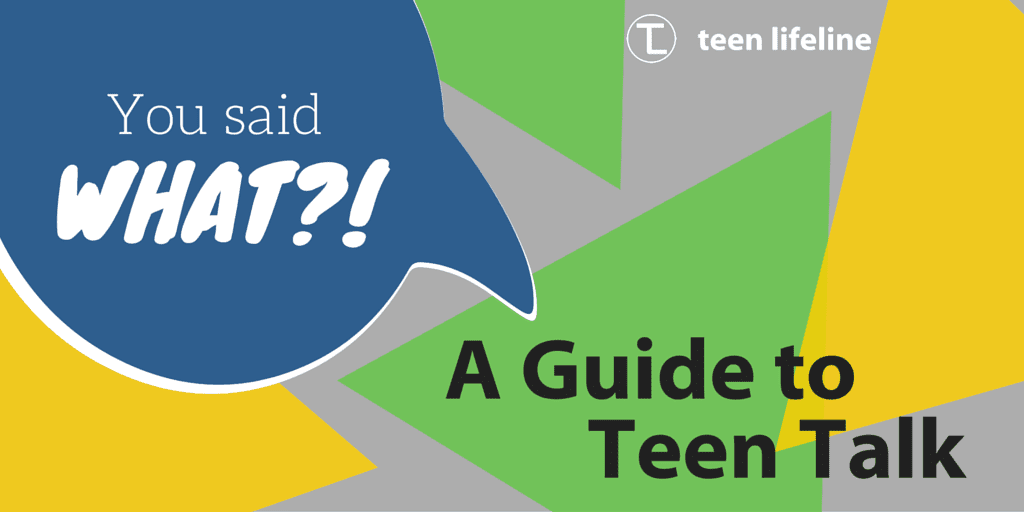
by Karlie Duke | May 5, 2016 | Parenting, Resources
When you hang out with teenagers every week who tend to push the boundaries and find themselves in trouble at school, you have learn some new vocabulary pretty quickly! This is the position I find myself in…often.
I cannot tell you how many times I have sat in a group, dumbfounded and confused, while the entire room laughs at a word or phrase I don’t know. Teenagers can sometimes have a different language. They talk in lots of letters and seemingly innocent phrases can mean something else entirely!
So what can we do? How do we keep up? What do these words even mean?!
If you spend any time with teenagers, you should find these principles helpful (and stick around for our teen term guide at the bottom):
Pay attention
This one seems self-explanatory, I know! But if you aren’t paying attention to what your teen is saying, the words they are speaking to their friends or the phrases they use in text messages and on social media, you won’t know where to start. Pay attention to what they, and their close friends, are saying – especially if you hear something that doesn’t make sense (i.e. a bunch of letters like wtf or bae).
Take note of what you don’t understand and follow-up on it! They often think that they are getting away with something by using code, so turn the tables on them and start listening and asking questions!
Ask them for clarification
After you have paid attention and hear a word that you don’t know, ask them about it. It could be possible that they don’t even really understand what it means and just hear it at school, or they might start acting funny and you’ll know you’re on to something!
If you hear something you are concerned about, don’t be afraid to confront that teenager and let them know that you are listening to what they are saying and care enough to start a conversation about it. But keep in mind, this should be a conversation – ask for clarification and then sit back and let them respond.
Google it
This tends to be my go-to, especially when I don’t want them to know that I have no idea what they’re talking about…
(Don’t tell my secret), but in times like these, I pretend like I know what these words and phrases mean. It’s not hard to figure out that they aren’t talking about monkey bars when they say they were doing “bars” and the rest of the group either laughs or looks quickly at me to check my reaction. At the time, I had no idea what bars were, but I pretended I did, shut down the conversation and went home to safely Google-it myself.
At Teen Lifeline, we firmly believe in being present and active in teenagers’ lives. This may mean asking awkward questions or having uncomfortable conversations when you figure out what they are actually talking about. But it is worth it! Show that you have some street-cred and keep up to date with the newest phrases and coolest terms.
Here’s a good starting point if you have no idea what to listen for:
(*Disclaimer: This blog post is not meant to make you paranoid or cause you to grill your teenager as soon as they get home. Not every teenager even knows what these words mean – please don’t assume the worst! Instead of panicking, pay attention and keep the door open for positive conversations!)
Teen Lifeline Dictionary
| Term | Meaning | Example(s) |
| Netflix & Chill | This is not just hanging out and watching movies - this means "hooking up" or having sex. | Wanna go Netflix and chill? |
| Bae | Before anyone else; baby; sweetie | Ryan Gosling is bae.
I love you so much bae!
|
| Hooking up | Could mean literally anything - kissing, making out, sex - ask what their definition is! | Did you hear that they have been hooking up? |
| GOAT | Greatest Of All Time. | Tony Romo is the G.O.A.T!
Those shoes are G.O.A.T. |
| Lit | Incredibly awesome; or extremely intoxicated. | This song is lit!
Last night, I got lit. |
| DM | Direct Message - private messaging on Twitter or Instagram | Can't talk now, DM me.
He slid in my DM. |
| Molly | Drug called MDMA or ecstasy | She took a Molly last night. |
| WTF | Pronounced "W-T-F," meaning "What the f***?!" | WTF is wrong with you?! |
| Goals | When something is attractive or it's something you aspire to. | Ben & Lauren are relationship goals.
Your hair is goals! |
| AF | Pronounced "af," meaning "As f***" | I'm hungry af.
That class was boring af.
She is annoying af. |
| PAW or PIR | Parents Are Watching or Parents In Room - if you see an acronym starting with 'P' ask questions! | Let's talk later PAW/PIR
|
| V | Short for "very." | I'm v tired.
Dinner was v good! |
Are there any other words or phrases you’re curious about? Do you have any suggestions for how to start this conversation? Share with us!
Karlie Duke was in one of Teen Lifeline’s original support groups and now is our Communications Director. She is passionate about encouraging students to live better stories.

by Karlie Duke | Apr 14, 2016 | Parenting, Support Groups
The more I work with teenagers, the more evident is that they are their own worst enemy and biggest critic.
Check out this story from one of our facilitators, Josh Hardcastle, about a conversation that happened in his support group with teenage guys:
A couple of weeks ago, we were talking about the negative influences and negative voices in our lives. Some of the guys in the group spoke up and were talking about how when other people put them down, they believe it. They believe that they…
Are Lazy.
Are Stupid.
Won’t Succeed.
Are Slow.
Are Punks.
Can’t get anything right.
So then I threw out the question, “What if you didn’t believe them?”
I had remembered a line from a book I read that said something like, “The names that we embrace are the names that we become.” I shared with them some of the struggles with the names that I had been called in High School by a coach. After hearing it so many times, I began to believe that I was that name.
There was something about this whole conversation and group time that really clicked with them. I could actually see hope and strength starting to resonate with a few of them. They were sitting up straight and absolutely silent. Not because they didn’t know what to say, but because it looked like they were thinking about not believing they were these names that they had been called for so long.
Towards the end of the group time, one of the guys asked, “So does this work with me too? Because I put myself down more than anybody else.”
Man that broke my heart! But we were able to have a conversation as a group about what that looked like and how we can avoid embracing the negative names and voices we call ourselves. I closed out the group by asking, “What do you guys notice about everyone’s pages and what they heard from the important voices in their lives?” A few of them gave me the answers that most everybody had written down their family or best friends, but one of my quiet kids raised his hand and said, “Everyone has more than two important, positive voices who speak into their lives.”
I took it one step further and asked, “So what does that mean?” Another guy jumped in and said, “That we should be listening and focusing on the positive voices and ignoring the negative ones.”
Boom. Nailed it.
Teenagers are surrounded by all kinds of negative and critical voices, but these voices do not just come from outsiders. Sometimes, the worst thoughts are coming from inside their own heads.
So what can we do? How can we help encourage teenagers to think positively and be a better judge of their self-worth? I have a few suggestions for what we can do as parents, teachers, mentors and friends:
1. Ask questions that will allow them to brag.
Instead of bringing up that “B” on a test, or the fact that they were late getting home (…again), ask one of these questions: “What is one thing that you did really well today?” or “How did you help someone today?”
By asking these question, you are prompting their own brain to focus on the positive aspects of the day. You are telling them that they are capable of great things and you want to hear about the things that they are going well.
Let’s help train teens to engage in beneficial bragging! Bragging that fosters a good sense of self-worth and positive self-esteem.
2. Point out the little things.
Did your teen wash the dishes without being asked? Say, “THANK YOU!”
Resist the urge to say something like, “What’s wrong with you?! You never do the dishes without asking!” or “Finally! Now you’re doing the dishes every night for the rest of your life!”
I know this might be a silly example, but by encouraging the little things they do without adding a backhanded dig or sarcastic comment, they will also pay attention to the important role they can play!
Tell them when you are proud. Hang up that last report card on the fridge. Brag about the way they love on their siblings. Teenagers are necessary, helpful, hardworking and FUN – don’t forget that!
3. Encourage realistic goal-setting.
When I am hard on myself or engage in negative self-talk, it tends to be when I am disappointed in myself or feel like I haven’t reached the goal I set for myself. After a busy week, I am upset that the house is a little messy and that I didn’t cook every meal at home. I beat myself up when I miss one tiny detail on a big project, or find a typo in a blog post.
Goals are a great thing to have, but we should be realistic and not sweat over the little things! Encourage teenagers to set small goals. When they reach that goal, help them celebrate and especially if they don’t matter – forget about the tiny things that might not be perfect.
Perfection isn’t a realistic goal. But here are a few realistic goal examples for teenagers:
- Be on time to school in the morning – who cares if you forgot to brush your hair or ate a pop tart instead of a well-rounded, healthy breakfast?!
- Help with one thing around the house – start small by making the bed, or doing the dishes after dinner!
- Improve on the next test – don’t get upset if the next grade isn’t a perfect 100, but strive to do better than that last test!
Once you help them come up with, write down and spend time on their goals, don’t forget to celebrate when a goal is reached!
What do you think of these ideas? How else can we encourage teenagers to engage in positive self-talk?
Karlie Duke was in one of Teen Lifeline’s original support groups and now is our Communications Director. She is passionate about encouraging students to live better stories.




